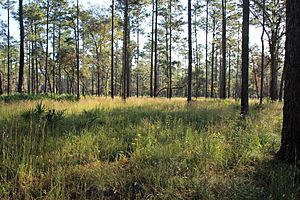Sandhill facts for kids
A sandhill is a special type of natural area, or ecosystem, found in places like Florida and other parts of the southeastern United States. It's a dry, sandy place that needs wildfire to stay healthy. Sandhills are not the same as sand dunes, which are often found near beaches.
These unique areas have fires very often, usually every one to five years. If there are no fires, the sandhill changes. It slowly becomes a forest with more oak trees.
Contents
What Makes Sandhills Special?
Sandhills have a very specific type of soil called Entisols. This soil is deep, sandy, and lets water drain away quickly. It also doesn't have many nutrients.
Even though Florida gets a lot of rain—about 130 centimeters (51 inches) each year—sandhills are still dry. This is because their sandy soil cannot hold much water. It's like pouring water into a sieve; it goes right through! This is why they are called "xeric," meaning dry.
Plants and Animals of the Sandhill
Many interesting plants and animals live in sandhills. They are specially adapted to this dry, fire-prone environment.
Sandhill Plants
The main trees and plants you will see in a sandhill include:
- Longleaf pine (Pinus palustris): These tall trees are very important to the sandhill ecosystem. They can survive fires.
- American turkey oak (Quercus laevis): This oak tree has leaves that look a bit like a turkey's foot.
- Wiregrass (Aristida stricta): This tough grass helps spread fires across the sandhill, which is important for its health.
Sandhill Animals
Sandhills are home to several rare animals. These creatures depend on the sandhill habitat to survive.
- Gopher tortoise (Gopherus polyphemus): This tortoise digs long tunnels underground. Many other animals use these burrows for shelter from fire and predators.
- Red-cockaded woodpecker (Picoides borealis): This small bird makes its nests in old longleaf pine trees.
- Sherman's fox squirrel (Sciurus niger shermani): This large squirrel is a subspecies found in the sandhills.
- Striped newt (Notophthalmus perstriatus): This small salamander lives in ponds near sandhills and is also quite rare.
Problem Plants
Some plants are not native to sandhills and can cause problems. These are called invasive species. They can take over and harm the natural plants and animals. Some examples are:
- Cogongrass (Imperata cylindrica)
- Camphor laurels (Cinnamomum camphora)
- Natal grass (Melinis repens)
These invasive plants can make it harder for the native sandhill plants to grow. They can also change how fires behave, which is bad for the ecosystem.


